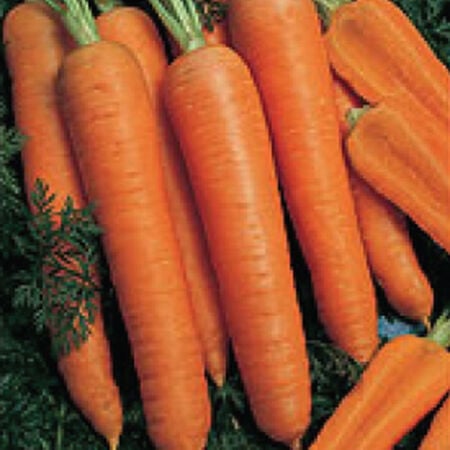Napoli, (F1) Carrot Seeds
Key Attributes
Key Attributes
Product Details
Weight
0.0095Depth
0.15Height
4.5Width
3.25Plant Height
6-12"Botanical Name
Daucus carota subsp. sativusSeed Type
SeedSeeds Per Gram
772Seeds Per Pound
350,000Row Spacing
16-24"Packet
500 SeedsSow Depth
1/4"Disease Resistance
ALS, BR, CLS, CS, LRSeeds Per Ounce
21,875Fruit Color
OrangeBreed
F1 HybridSun
Full SunTypes
Nantes CarrotsMaturity
Early SeasonLife Cycle
AnnualCarrot Weight
2-3 OuncesSow Method
Direct SowPlant Spacing
1-2"Categories
CarrotGermination
11,12,13,14,15,16,17,18,19,7,8,9,20,10,21Days To Maturity (# Days)
55Organic
OrganicSeeds Per Acre
2.1 lbsComponents
Growing Instructions
![]() Learning Download: How to Grow Carrots
Learning Download: How to Grow Carrots
Carrots bring bountiful nutrients to the table, as well as a burst of color. Carrots are rich in vitamin A, which helps prevent poor eyesight. In addition to being a tasty treat to humans, they also make a healthy treat for pets.
Before Planting: Carrots require well-drained soils, with a pH range of 6.0-7.0. Till the area so you have deep, loose, and fertile. Mix in sandy and peat moss for best results which will help give good moisture retention and straight, smooth roots.
Planting: Sow from early Spring to Midsummer, space seeds 1″ apart (about 15-20 seeds/ft.), 1/4- 1/2″ deep, in single rows 16-24″ apart. Sprinkle the soil surface to keep moist. Don’t allow soil to crust before the emergence of seedlings which takes 1-3 weeks, depending on temperature and moisture. Thin young seedlings to 1-2″ apart, depending on root size desired.
Watering: Water at least 1 inch per week.
Fertilizer: Mulch can be spread lightly around the carrots. Keep up on weeding, and fertilizer can be used five weeks after planting.
Days to Maturity: Carrots are ready for harvest two-and-a-half months after planting, when their diameter reaches about a half-inch or desired size. (See each variety for days to maturity)
Harvesting: Carrots may be dug any time after they reach the desired size. Generally the best harvest period lasts about 3 weeks. Cool Fall weather will increase sugars and taste during harvest. Sow new seeds every 2-3 weeks for continuous supply of carrots.
Tips: Plant carrots intended for winter storage about 100 days before expected fall frost. Carrots store best at 32°F and 98% relative humidity.
AVG. Seeding Rate: 1 M/33′, 5M/166′, 25M/830′, 720M/acre at 30 seeds/ft. in rows 24″ apart.
Shipping Schedule
Our Seed Promise
 "Agriculture and seeds" provide the basis upon which our lives depend. We must protect this foundation as a safe and genetically stable source for future generations. For the benefit of all farmers, gardeners and consumers who want an alternative, we pledge that we do not knowingly buy or sell genetically engineered seeds or plants.
"Agriculture and seeds" provide the basis upon which our lives depend. We must protect this foundation as a safe and genetically stable source for future generations. For the benefit of all farmers, gardeners and consumers who want an alternative, we pledge that we do not knowingly buy or sell genetically engineered seeds or plants.
The mechanical transfer of genetic material outside of natural reproductive methods and between genera, families or kingdoms, poses great biological risks as well as economic, political, and cultural threats. We feel that genetically engineered varieties have been insufficiently tested prior to public release. More research and testing is necessary to further assess the potential risks of genetically engineered seeds. Further, we wish to support agricultural progress that leads to healthier soils, to genetically diverse agricultural ecosystems, and ultimately to healthy people and communities.
To learn more about the "Safe Seed Pledge" please visit www.councilforresponsiblegenetics.org.

